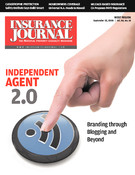Telecommuting is growing at a rate of 15 percent annually, and with good reason. As telecommunications technology develops and the economy becomes increasingly more digital, telecommuting makes sense because it leads to increased production, decreased sick leave, decreased turnover, reduced office space needs, and increased organizational skills, according to the Municipal Research and Services Center.
Additionally, more flexibility at work means there will be less pollution and traffic congestion from commuters — and more reason for insurers to provide a new premium option for automobile insurance.
One such option may soon be coming to California, if Insurance Commissioner Steve Poizner gets his way. The commissioner has proposed pay-as-you-drive insurance regulations that would allow insurers to base auto insurance premiums exactly on how many miles a motorist drives.
In addition to being a good public relations move given today’s high gas prices, “A major motivation behind the commissioner’s push to make [PAYD a type of coverage] available [to consumers] is to encourage Californians to drive less, reducing the environmental strain of carbon emissions that result from driving,” stated Molly DeFrank, deputy press secretary for the Office of Insurance Commissioner.
Yet no matter how positive the proposal, there are many details that need to be ironed out. The main challenge is figuring out how insurers can obtain mileage logs to verify a consumer’s qualifications for a lower premium rate, while balancing that with personal privacy.
Eric J. Weibel, president of Alta Financial & Insurance Services LLC who attended an early public hearing on PAYD insurance, said among the options to verify mileage are for companies that conduct smog checks to also certify odometer readings, or use global positioning systems in vehicles.
“Mileage is very predictive of loss. If you can verify it, it’s very accurate. But it has to be done carefully,” Weibel cautioned. “PAYD is a very good idea, but there is a lot of complexity to it. “There’s the potential for unintended consequences and consumer dissatisfaction.”
Consumer advocacy groups are watching the proposal closely, aiming to prohibit insurance companies from tracking whatever information they choose — including speed, acceleration, location and time of day, in addition to mileage. No driver should be forced to choose between fair insurance rates and protecting their privacy, said Consumer Watchdog. “Where I drive, when I get there and whether I stop on the way is not the business of my insurance company, or any other corporation who wants to place eyes in my car,” said the group’s spokeswoman Carmen Balber.
Poizner himself doesn’t believe GPS technology has a place in vehicles for privacy and public policy reasons either. “It is vital that the privacy of drivers remains intact. I will not approve any auto insurance policy that aims to utilize GPS devices in order to obtain location data from consumers,” he said.
Despite the dual benefit of reducing insurance bills and emissions, until the mileage verification system can be worked out, it seems the Golden State is still a long way from putting the last piece in the PAYD puzzle.
Was this article valuable?
Here are more articles you may enjoy.


 Jury Finds Johnson & Johnson Liable for Cancer in Latest Talc Trial
Jury Finds Johnson & Johnson Liable for Cancer in Latest Talc Trial  Preparing for an AI Native Future
Preparing for an AI Native Future  Former Broker, Co-Defendant Sentenced to 20 Years in Fraudulent ACA Sign-Ups
Former Broker, Co-Defendant Sentenced to 20 Years in Fraudulent ACA Sign-Ups  Viewpoint: Runoff Specialists Have Evolved Into Key Strategic Partners for Insurers
Viewpoint: Runoff Specialists Have Evolved Into Key Strategic Partners for Insurers 


